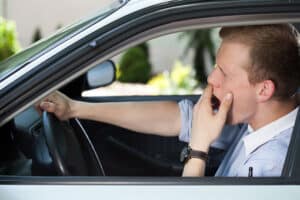
According to the National Highway Traffic Safety Administration, drowsy driving causes an estimated 91,000 crashes each year — resulting in nearly 800 fatalities and 50,000 injuries.
The reported numbers of drowsy driving crashes, however, may not be as accurate as we think. Drowsy driving crashes often lack physical or traceable evidence. In addition, police aren’t trained to determine if a driver was drowsy behind the wheel at the time of a crash.
Federal statistics previously concluded that drowsy driving is a factor in 1-2 percent of all crashes, but a recent study using in-vehicle dash cams to capture eye closure determined that drowsy driving was a factor in roughly 10 percent of crashes.
Who is at risk of drowsy driving?
Anyone can get tired behind the wheel but certain populations are especially at risk. These include:
- Drivers under age 25: According to the National Safety Council, drivers under age 25 are involved in about 50 percent of drowsy driving crashes.
- People with undiagnosed or untreated sleep disorders: Common sleep disorders include insomnia, sleep apnea, restless legs syndrome (RLS), and narcolepsy. If untreated, these conditions can contribute to a drowsy driving crash.
- Shift workers: People who work overnight or rotating shifts account for roughly 15 percent of the U.S. workforce. This creates conflict with the body’s biological clock (circadian rhythm), which can put shift workers at risk of nodding off behind the wheel.
- Commercial truck drivers: Truckers often spend long hours on the road. Even with the federal hours-of-service regulations in place, inadequate sleep can put a truck driver at risk of causing a serious crash.
- Business travelers: Those who travel overseas or cross-country for business often experience jet lag — an adjustment to the change in time zones.
- Parents of young children: Many parents of infants find themselves waking up frequently for feeding and general care. Physicians say that parents of newborns will likely lose about two hours of sleep each night until a child reaches five months old.
“Over one-fifth of all fatal crashes involve driver drowsiness and just missing two hours of sleep can quadruple a driver’s crash risk,” said Amy Stracke, managing director of traffic safety advocacy for the American Automobile Association.
In order to mitigate the risk of drowsy driving, the authors of a Sleep Review Mag article partnered with the New York State Governor’s Traffic Safety Committee to launch stopdrowsydriving.org, an interactive and educational website. In addition, they launched a social media campaign to encourage people to visit the site and take a sleepiness quiz to determine the likeliness of falling asleep while driving.
What are your legal options?
Unfortunately, sleep deprivation is part of our culture. People who juggle jobs, families, money, health, and hobbies may sacrifice a few hours of sleep to fit everything in.
The car accident attorneys at Zbinden & Curtis, Attorneys At Law, have seen the devastation caused by drowsy driving. If you or a loved one was injured in a crash with someone who fell asleep behind the wheel, our legal team will get to the bottom of it. Even without hard evidence of drowsy driving, the evidence we gather from your crash may help build a strong claim against the at-fault driver and his or her insurance company.
To find out how we can help, contact us today and set up your free case evaluation.
This entry was posted on Monday, September 16th, 2019 at 1:17 pm and is filed under Car Accidents. You can follow any responses to this entry through the RSS 2.0 feed. You can leave a response, or trackback from your own site.









